
Pat McQuaid Interview – September 2009 –
Anthony O’Malley Versus Pat McQuaid

Pat McQuaid has gone from physical education teacher and bike shop owner in Dublin, Ireland, to the pinnacle of international cycling as president of the UCI.
From a family of ten, he emerged as Ireland’s National Cycling coach and brought a team to the Los Angeles Olympics in 1984.
With the Worlds only days away, O’Malley tracked him down over a few phone calls in Switzerland (at his UCI office) and on the way to Belgium (while in his car) recently. ***He assured me he was driving with a Bluetooth!
Here’s how it went.
O’Malley: Watching the Vuelta there seems to be a trend toward taking in other countries in Grand Tours. Is this a good thing?
Pat McQuaid: This is a good thing. The Giro and the Vuelta are trying to build up the stature of these races. Look at the huge crowds in terribly bad weather. 40,000 people at the opening TT.
O’M: There were awful crashes on the road to Liege. Is this the fault of the organizers?
P. McQ: No, they are the same roads as Liege-Baston-Liege, the oldest classic race of them all. The Vuelta [organizers] want to capitalize on the historical mystique associated with Liege-Baston-Liege. As long as there is enough thought for the rider’s needs and transfers from stage to stage goes well.
 O’M: What teams are really tackling the doping in cycling?
O’M: What teams are really tackling the doping in cycling?
P. McQ: I can’t really specify, but the UCI follow the rules of WADA and its becoming more difficult for guys who’ve doped to get onto a pro team. Once they serve out their ban they come back. We apply the rules. The culture is changing as are attitudes and there is a lower level of tolerance for doping. I’d say the globalization of the sport is bringing different attitudes and ethics in and it’s not dominated by the big European countries anymore. In the past it was a small group of countries, France, Belgium, Italy, Holland and Spain. There was a lot less emphasis on anti-doping back then. Guys were 70% fitness trained and used medical doping for the other 30%. It’s these guys that are suffering as a result of the anti-doping. Now you have the Garmins and Columbias, teams that have a zero tolerance for this.
O’M: What countries are nurturing cycling at a pro level the most effectively?
 P. McQ: If you look at the British, here you have a track racer, Bradley Wiggins, he sits down with his trainer and he loses weight, builds muscle and hones in on his climbing ability.
P. McQ: If you look at the British, here you have a track racer, Bradley Wiggins, he sits down with his trainer and he loses weight, builds muscle and hones in on his climbing ability.
O’M: He was incredible on Mont Ventoux.
P. McQ: Yes he was. British cycling is the best example of how it should be done.
O’M: Will Irish cycling ever get back to the golden era of the Kelly-Roche years?
P. McQ: The Irish Federation of Cycling (IFC) didn’t plan for the future. They didn’t think in a strategic way like the British Olympic Committee did. In 1997 and 1998 they analyzed the sport and looked at ‘hard medals’ and ‘soft medals’. Hard medals were almost impossible, soft were possibilities. Most of the track medals were historically divided up between France, Germany and Italy. The Brits put a program together and got one million pounds in funding per year. In Sydney they got a gold, silver and bronze on the track. Only one bronze justified the one million, but they did much better!
O’M: And then came Athens in 2004?
P. McQ: Yes, after 2000 they built toward Athens. They justified two million a year until Athens. Now look what happened in Beijing last year. By 2008 they were being funded four million pounds a year and they dominated on the track!
O’M: Why can’t the Irish do this, emulate the Brits?
 P. McQ: We have a smaller economy and the availability of athletes is lower due to the GAA (Gaelic Athletic Association – Irish football and hurling), soccer and rugby. The pool of young athletes is reduced dramatically. 80% of young athletes in Ireland are playing these games. The odds that one cyclist will come up the ranks are huge. If they do they’re superstars – Kelly or Roche.
P. McQ: We have a smaller economy and the availability of athletes is lower due to the GAA (Gaelic Athletic Association – Irish football and hurling), soccer and rugby. The pool of young athletes is reduced dramatically. 80% of young athletes in Ireland are playing these games. The odds that one cyclist will come up the ranks are huge. If they do they’re superstars – Kelly or Roche.
O’M: How many professional cyclists are represented by UCI?
P. McQ: There are thousands. We have three divisions: Pro Tour with about 1,000 members, top twenty teams. Then a second division: Pro-Continental European pro members and finally a third division: Continental or national pro riders.
O’M: For example, USA Cycling is a continental affiliate of UCI?
P. McQ: Correct.
O’M: Did you ever race in the US?
P. McQ: I did in Central Park, the Lowenbrau Race Series. There were races 4 or 5 races in New York, Chicago, and LA. I raced with Alan McCormack and he stayed here.
O’M: Tell me about the journey of Pat McQuaid, bike shop owner to head of the UCI? Did you ever envision this happening when you were training in the lashings of rain up and down the Wicklow and Dublin mountains?
 P. McQ: [Laughing] I didn’t. It was fate more than a plan! In the 70’s I had raced and was a Physical Ed teacher in Balinteer Community School in Dublin for ten years. Then I raced for a British team, Viking Cycling Team.
P. McQ: [Laughing] I didn’t. It was fate more than a plan! In the 70’s I had raced and was a Physical Ed teacher in Balinteer Community School in Dublin for ten years. Then I raced for a British team, Viking Cycling Team.
O’M: My first racing bike was a Viking Vision!
P. McQ: Good, anyway I raced with Sid Barras, Keith Lambert in 1977 and 1978. After I got out of pro cycling, I was asked to train the Irish national team and in 1981 became the national coach. Then in 1984 we went to the Olympic games in los Angeles with Paul Kimmage, Phil Cassidy, Martin Earley and Seamus Downey. Seamus lives in the US now. And Gary Thompson. After the 1984 Olympics, I organized the Kellogs City Center races in England. Eddie Merckx was the big invited rider.
O’M: Do you know Eddie personally?
P. McQ: I do, he just sold his bike factory to some big company and is involved in organizing the Tour of Qatar!
O’M: So getting back to your journey?
P. McQ: Well me and Alan Rushton began promoting the Kellogg Race series and from that came the Nissan Classic and the Kellogg Tour of Britain. Between 1985 and 1993 we did the Nissan Classic in Ireland. Then from 1986 to 1994 we ran the Tour of Britain.
O’M: In recent cycling publications, there are suggestions that you got the job through connections, pull. Is this true?
P. McQ: Journalists write what they want, not the facts and no there was no pull involved. I had a track record in Ireland and England of organizing and promoting races, plus I was an ex-pro. In 1994, ’95 and ’96 I was in the Philippines promoting a racing tour there. It was a 3 week race, my first real international tour, where of population of 70 million people, 70% follow the Tour of the Philippines live on the radio. Then I went on to promote the Tour of Langkawi in Malaysia.
O’M: So you have huge experience in this area?
P. McQ: Yes I do.
O’M: Where do you think a quantum leap in cycling will occur, globally?
P. McQ: Good question. I think Asian countries will be big in the future, China, Malaysia and former Soviet Republics, like Kyrgyzstan and other Central Asian nations. Korea also is growing. They have an economy that can support bike racing.
O’M: Give me a typical week in McQuaid’s schedule? What do you actually do?
 P. McQ: [Laughing] Well last Wednesday I had a meeting with the road commissioner for the Tour Down Under, Friday night I flew to Holland for the start of the Vuelta, on Sunday. I had to fly to Kazakhstan to discuss the future of Astana, was there Monday and Tuesday [NOTE: Interview was conducted on a Wednesday morning in September]. I was back to Switzerland yesterday, Tuesday. Tomorrow [Thursday] I’ll be in Germany to attend Euro Bike and sign two contracts for UCI with Shimano and Santini.
P. McQ: [Laughing] Well last Wednesday I had a meeting with the road commissioner for the Tour Down Under, Friday night I flew to Holland for the start of the Vuelta, on Sunday. I had to fly to Kazakhstan to discuss the future of Astana, was there Monday and Tuesday [NOTE: Interview was conducted on a Wednesday morning in September]. I was back to Switzerland yesterday, Tuesday. Tomorrow [Thursday] I’ll be in Germany to attend Euro Bike and sign two contracts for UCI with Shimano and Santini.
O’M: Do you get out on the bike at all?
NOTE: During the interview was halted abruptly by a Swiss lightning strike disconnecting our phone lines!
P. McQ: I was going to get out today but we just had a lightning storm and it doesn’t look likely.
O’M: What sort of a bike have you got?
P. McQ: Look.
O’M: So getting back then to the UCI and your trajectory?
P. McQ: Well in 1997 I was president of the Irish Cycling Federation (ICF) and during that time I was nominated to the board of UCI as president of Road Commission. I held that position for 8 years and in 2005 the European members asked me to be president and I accepted.
O’M: How had you been prepared for the politics inherent in the position?
P. McQ: My father and uncle were members of CRE (another Irish cycling organization) and ICF. I knew first hand how split people could be when it came to cycling.
O’M: It was in your DNA
P. McQ: [Laughing] It was!
O’M: How much power does UCI really have? Doesn’t ASO hold all the cards?
P. McQ: Yes ASO is economically very powerful. Money dictates, whether you like it or not! ASO makes a 30 million Euro profit, that’s 30 million net! They make 1.5 times more in profit than the entire UCI budget!
O’M: Does the mainstream media, especially cycling magazines, do a good and thorough job of covering (or uncovering) the doping going on in Pro cycling?
P. McQ: I don’t think they do. It’s one sided. They sensationalize the issue.
O’M: In many cycling magazines, both here in the US and in Europe, every second page is made up of glossy bike parts, fancy bikes interspersed with “tests’ by riders of various equipment! Then the writing comes in a half castrated form of low risk questioning, completely avoiding any real questions on doping and its effects. Would you agree with this statement?
P. McQ: I agree, all sports reporting is like that.
O’M: Who actually funds the UCI? What is the money spent on?
P. McQ: There are two branches of funding. The IOC (International Olympic Committee) gives us money for the development of the World Cycling Center and development of the sport at the Olympic level. And the second is from the World Championships, especially the road race from where we get a portion of the television rights. UCI is a non-profit organization, we don’t seek to make any profit. Any revenue we get from television goes back into the sport.
O’M: There will be a few new faces in 2010 – Columbia HTC women’s team a local CRCA, Evie Stevens. Have you heard of her?
P.McQ: No I haven’t but I’m sure I will. Taylor Phinney is another new racer with huge potential.
O’M: What is the UCI doing to promote women’s professional cycling?
P. McQ: In UCI, the road department is involved in women’s cycling. Since the seventies, international women’s cycling has come a long way. I remember back in the seventies watching the world championship road race. It was like watching paint dry. We have been actively involved in promoting pro women’s cycling. Last year’s worlds were so animated, really great racing.
O’M: Any tips for the men’s road race in two weeks time?
 P. McQ: Evans looks to be on form. And Andy Schleck left the Vuelta early. He could be a good contender.
P. McQ: Evans looks to be on form. And Andy Schleck left the Vuelta early. He could be a good contender.
O’M: Has training really changed since the 70’s and does equipment make a bigger difference now more than ever?
P. McQ: Training has changed, become much more scientific and as we get rid of doping, science will improve training. Sports psychologists will play a bigger role. With doping 60-70% was about training and the remaining 40-30% was medical preparation. We are getting out of that era. And yes bikes are much lighter, carbon frames, TT bikes etc. TT preparation is much more scientific.
O’M: In the 70’s and 80’s riders didn’t even wear helmets, isn’t it gone too babysitting by a nanny now with radios in ears and no intuition being used by riders now?
P. McQ: On a personal level, I agree radios take away from the racing. However we tried no radios in the Tour this year and it didn’t prove to be a success. Helmets protect heads. With regards to radios, it should be about the athlete, not Directive Sportives shouting instructions from a car.
O’M: Will Lance’s new team bring increased interest into Pro cycling?
P. McQ: Of course it will. With 5,000 shops across the US (Radio Shack) and lots of enthusiasm it will bring a big bang to Pro cycling.
O’M: Does the UCI have an impact on these poorer countries economically?
P. McQ: We’re not an NGO (Non-Governmental Organization). We’re developing cycling in many African countries. Before I was UCI president there were just four countries in Africa where pro tours were being held. Now UCI is active in 25 countries. We’ve opened a Continental Cycling Center in South Africa, Johannesburg. We have invested in equipment in many African countries. We’ve put pressure on the S.A. federation to get their act together, to develop their good network of tracks right across the country. Johannesburg is 6,000 feet above sea level, so pro cyclists can train there at altitude.

O’M: In the 70’s you were criticized for travelling to S.A. with Sean Kelly during the era of apartheid. What was going on in your mind back then?
P. McQ: Listen, in 1975 I was 22 or 23 years old. It was a huge opportunity to travel and see for myself what was really going on! I got to see the country. It had a big influence on me. I saw no apartheid in the races. Blacks and whites raced alongside one another. One of the teams was made up of black miners.
O’M: What are the biggest challenges going ahead? What will the UCI be doing in 2010 to face these challenges?
 P. McQ: We will continue our fighting against doping and expand more teams beyond the usual European heartland, teams from outside the dominant countries. Places like Africa, Asia etc. where the sport is growing very fast. We want to also improve the image of cycling around the world and retain our place in the Olympics, develop our role within the Olympics.
P. McQ: We will continue our fighting against doping and expand more teams beyond the usual European heartland, teams from outside the dominant countries. Places like Africa, Asia etc. where the sport is growing very fast. We want to also improve the image of cycling around the world and retain our place in the Olympics, develop our role within the Olympics.
O’M: Thanks Pat, drive safely.
P. McQ: Thanks, send me the link when you’ve written it up.
O’M: Will do, bye.

No mention of Pat breaking apartheid into race in South Africa….
-10 for reading comprehension
Really nice work O’Malley – it does make me dislike the guy less knowing a bit more about him. Also it’s a good reminder that it might not be him making the decisions not to go after certain dopers (why is Valverde riding again?) but other, more powerful factions in Cycling like ASO.
Did you ask him anything about who would win in deathmatch between him and Dick Pound?
With a name like Dick Pound, well….
Did you ask him about his lucky charms? Apparently, they’re always after his lucky charms.
that o’malley took 5 questions to mention sean kelly or stephen roche, yet for the TdF viewing party giveaway questions, it was all kelly/roche right out of the gate. damn irish.
Orange stars, green clovers, and little blue pills…
ask him what he think about champsys and ray alba
maybe champsys can race the tour next year
What’s a chance of UCI putting pressure on US federation to get their act together and develop track cycling network in USA?
NEW YORK CITY DOESN’T HAVE AN INDOOR TRACK.
Nice work Anthony.
Should focus its energy more towards cross than track. Its a growing sport vs a dying sport. Cross has no competing cycling disciplines in the fall (Track as Mtn bike, and road). Plus, a cross course can be set up in any park or open field. Tracks, too expensive to build and maintain for a handful of guys and girls who like to ride in circles.
Really great work here. Great read..
Definitely!! New York should build an indoor track AND a four-seasons cyclocross course right after it builds its unicorn stable and hangover-free vodka distillery.
Well that was disjointed…
Would’ve been nice to get PM’s thoughts on the upcoming Irish riders–Roche, Martin, and Philip Deignan. They’re doing great and yet not one mention. The interview generally seems like a bunch of random questions. Could’ve been much better.
I would have like to know if the guy prefers Irish steel-cut oatmeal or regular oats. Those are the kinds of burning questions that matter.
Did he smell clean as a whistle
zinger!
damned funny ads, those.
the cereal and soap gags are he-larious, but lets cut right to the drinking and fighting jokes… or more likely, why don’t you guys just get back to your usual vaguely racist comments about more recent immigrants?
Nice piece- It makes it tough to hate the guy after hearing he owned a bike shop (punishment enough).
Nice piece O’mally. Enjoyed it.
i have a great question
we basically have no testing here in the good old USA. we read you are targeting prospective cheats based on outrageous performances.
why does the USA cycling not do this on a regional or local level.
because they know they’d lose a lot of members…
the Di-lithium crystals? Captain she can’t take much more!
oh wait he’s Scottish damn…
On the seventh day the Lord rested, but before that he did, he squatted over the side of England and what came out of him… was Ireland. No offense son.
soft balls.
Didn’t want to go after Hein’s stooge, didja?
By: Noa Chamois
Wed, 09/16/2009 – 5:18pm On the seventh day the Lord rested, but before that he did, he squatted over the side of England and what came out of him… was Ireland. No offense son.
You can’t even spell you fool. Maybe read a couple of books about the history of Ireland before you post your stupid comments and sign your name dope!
Cool interview Puny! Hope all is well.
-lee3
thanks, send me an email and let’s catch up. You in LA?????
Hey Feinan O’Dingdong, I was quoting Gangs of New York you idot.
Lee 3 !
you forgot to use “”
Ireland, having several dozen million fewer inhabitants than England, has managed to produce two of the greatest cyclists of all time.
England? Well, we’re wait politely and patiently.
So if you’re going to bash Ireland on a cycling site, at least say something intelligent.
Sean Kelly never doped. Oops!
Love,
–Union Jack
England had/has Paul Sherwin and Phil Liggett.
Well, just sayin’….
I see that McQuaid is still selling his old Europhobic line about doping being particular to ‘France, Belgium, Italy, Holland and Spain’. He conveniently ignores the fact that the American Olympic squad in 1984 was blood doped to the gills, then we have the Hamilton twins, Fraud Landis and Pharmstrong. Sean Kelly was under the needle of no less the Willy Voet, ‘peloton gossip’ has it that Roche all but destroyed his health with doping, then there were the revelations of Shay Elliot, another Irishman. Add to that Tom Simpson’s amphetamine fuelled career (and death) and it is clear just how one-eyed Puppet Pat really is.
Locknut wrote:
“i have a great question
we basically have no testing here in the good old USA. we read you are targeting prospective cheats based on outrageous performances.
why does the USA cycling not do this on a regional or local level.”
Probably because the cost of testing is really high. USA Cycling could never afford to test all events. But even the threat of random testing for all categories at everything from Fitchburg to Floyd would do a lot to cut out some of the cheating.
4:47am
I tend to agree but trying to say who the greats of cycling are AND AT THE SAME TIME saying that some were baggers and some weren’t is, well, impossible really. As it stands, Kelly and Roche ruled, dopers or not; the Brits have had many good riders, but no greats, dopers or not. This is all in response to the bozo talking smack about Old Erin. That’s all.
Hey the Brits have David Millar. Oh yeah, he won all his big stuff while doped. Nevermind…
but the flow of the questions didn’t seem right. I guess this is due to the interview being done over multiple calls.
I want to know how you got his phone number?
You should have asked him how often he reads NYVelocity.com?
The greatest Irish Cyclist ever to beat Roman Kreuziger and win a Vuelta stage into the walled city of Avila while riding a Cervelo.
http://www.sporza.be/permalink/1.599606
doping being particular to ‘France, Belgium, Italy, Holland and Spain’. He c 646-230 exam onveniently ignores the fact that the American Ol ympic squad in 1984 was blood doped to the gills, then we have the Hamilton twins, Fraud Landis and Pharmst